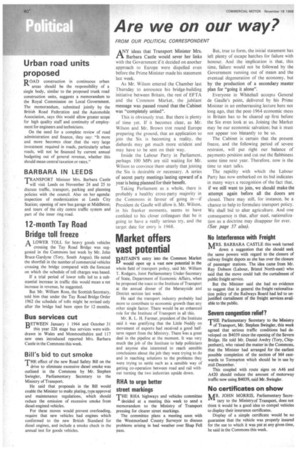Are we on our way?
Page 42

If you've noticed an error in this article please click here to report it so we can fix it.
FROM OUR POLITICAL CORRESPONDENT
Arr ideas that Transport Minister Mrs. Barbara Castle would sever her links with the Government if it decided on another approach to Europe were dispelled even before the Prime Minister made his statement last week.
As Mr. Wilson entered the Chamber last Thursday to announce his bridge-building initiative between Britain, the rest of EFTA and the Common Market, the jubilant message was passed round that the Cabinet was "completely united".
This is obviously true. But there is plenty of time yet. If it becomes clear, as Mr. Wilson and Mr. Brown trot round Europe preparing the ground, that an application to join the Six is becoming a reality, the diehards may get much more strident and may have to be sent on their way.
Inside the Labour Party in Parliament, perhaps 100 MPs are still waiting for Mr. Wilson to convince them utterly that joining the Six is desirable or necessary. A series of secret party meetings lasting upward of a year is being planned for their benefit.
Taking Parliament as a whole, there is probably a healthy cross-party majority in the Commons in favour of going in—if President de Gaulle will allow it. Mr. Wilson, in his franker moments, seems to have confided to his closer colleagues that he is going to have a really serious try, and the target date for entry is 196B.
Market offers vast potential
TIRITAIN'S entry into the Common Market -11-' would open up a vast new potential in the whole field of transport policy, said Mr. William T. Rodgers, Joint Parliamentary Under-Secretary of State, Department of Economic Affairs, when he proposed the toast to the Institute of Transport at the annual dinner of the Merseyside and District section last week.
He said the transport industry probably had more to contribute to economic growth than any other single factor. There would be an enhanced role for the Institute of Transport in all this.
Mr. R. L. H. Farmer, president of the Institute said it was gratifying that the Little Neddy on movement of exports had received a good halfterm report from the Ministry. Thereiivas a great deal in the pipeline at the moment. It was very much the job or the Institute to help politicians and anyone else interested to reach sensible conclusions about the job they were trying to do and in reaching solutions to the problems they were trying to settle such as a sensible way of getting co-operation between road and rail without turning the two industries upside down.
RHA to urge better street markings THE RHA highways and vehicles committee decided at a meeting this week to send a memorandum to the Ministry of Transport pressing for clearer street markings.
The committee plans a meeting soon with the Westmorland County Surveyor to discuss problems arising in bad weather over Shap Fell pass.
But, true to form, the initial statement has left plenty of escape hatches for failure with honour. And the implication is that, this time. failure would not be followed by the Government running out of steam and the eventual degeneration of the economy, but by the production of a secondary master plan for "going it alone".
Everyone in Whitehall accepts General de Gaulle's point, delivered by his Prime Minister in an embarrassing lecture here not long ago, that the post-1964 economic mess in Britain has to be cleared up first before the Six even look at us. Joining the Market may be our economic salvation; but it must not appear too blatantly to be so.
The Cabinet is certain that the present freeze, and the following period of severe restraint, will putright our balance of payments position and cut out the flabbiness some time next year. Therefore, now is the time to start talks.
The rapidity with which the Labour Party has now embarked on its bid indicates in many ways a recognition of the fact that, if we still want to join, we should make the attempt again before all the doors are closed. There may still, for instance, be a chance to help to formulate transport policy. We shall bid to alter agriculture. And one consequence is that. after steel, nationalization as a doctrine may disappear for ever. (See page 57 also).
No Interference with Freight
MRS. BARBARA CASTLE this week turned down a suggestion that she should seek the same powers with regard to the closure of railway freight depots as she has over the closure of passenger stations. The idea came from Mr. Ray Dobson (Labour, Bristol North-east) who said that the move could halt the curtailment of public freight service.
But the Minister said she had no evidence to suggest that in general the freight rationalization policy of the Railways Board had led to unjustified curtailment of the freight services available to the public.
Severn congestion relief?
THE Parliamentary Secretary to the Ministry of Transport, Mr. Stephen Svringler, this week agreed that serious traffic conditions had developed on B4039 since the opening of the Severn Bridge. He told Mr. Daniel Awdry (Tory, Chippentiarn), who raised the matter in the Commons, that the Minister had arranged for the earliest possible completion of the section of M4 eastwards to Tormarton which should be in use by mid-December.
This coupled with route signs on A46 and A420 should reduce the amount of motorway traffic now using B4039, said Mr. Swingler.
No certificates on show
MR. JOHN MORRIS, Parliamentary Secretary to the Ministryof Transport, does not think it would be a good idea to compel vehicles to display their insurance certificates.
Display of a simple certificate would be no guarantee thatthe vehicle was properly insured for the use to which it was pot at any given time, he said in the Commons this week.




































































































































